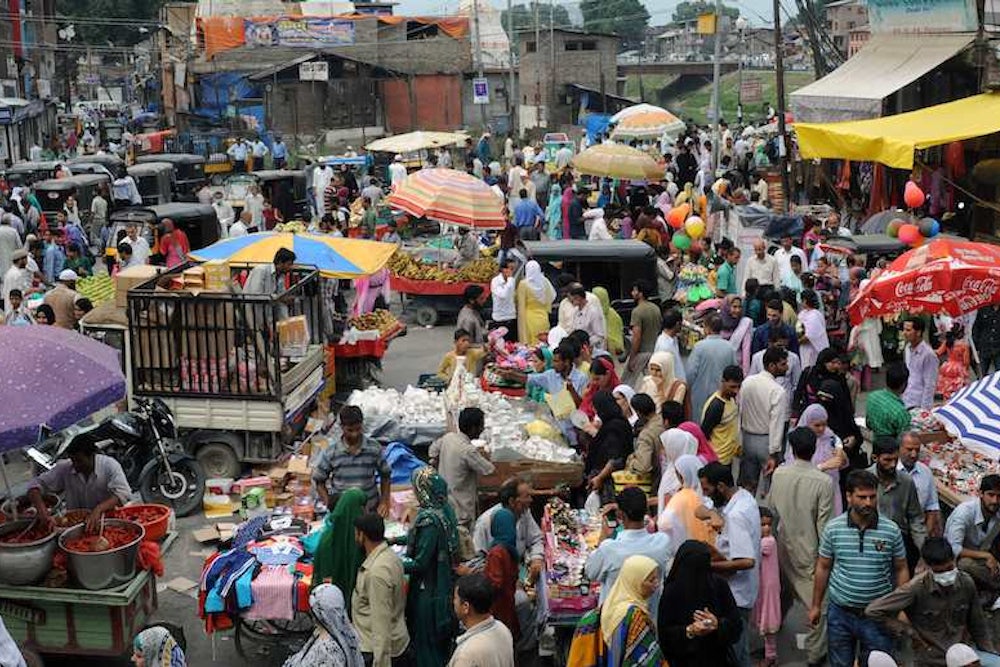Salman Rushdie's magnum opus Midnight's Children was set on this very date—presenting us with the perfect time to republish The New Republic's original review of the book.
Salman Rushdie's oracular novel begins:
I was born in the city of Bombay . . . once upon a time. No, that won't do, there's no getting away from the date: I was born in Doctor Narlikar's Nursing Home on August 15th, 1947. And the time? . . . Oh, spell it out, spell it out: at the precise instant of India's arrival at independence, I tumbled forth into the world. There were gasps. And, outside the window, fireworks and crowds . . . I was left entirely without a say in the matter. I, Saleem Sinai, later variously called Snotnose, Stainface, Baldy, Sniffer, Buddha and even Piece-of-the-Moon, had become heavily embroiled in Fate—at the best of times a dangerous sort of involvement. And couldn't even wipe my own nose at the time.
From the first paragraph it is clear that although the tone of much of this novel is comic, even glib, the trajectory of Saleem's narrative is pessimistic, tragic. Saleem Sinai, spokesman of reason and forbearance, born at that moment of hope and expectation, is slowly overtaken by history. Yet, as he tells us later in the story (after he has chronicled much of his country's loss of innocence), “Men of worth have always roamed the desert.”
Even before his birth—during his mother's pregnancy—Saleem's destiny is to become public property. Born to Moslem parents in Bombay in 1947 (like the author), Saleem observes the partitioning of his country, spends a number of years in “exile” in Pakistan, fights as a soldier in the Indo-Pakistani war of 1965 and later in Bangladesh, and returns to India just before Mrs. Gandhi calls the State of Emergency. Along the way, there are riots, riots, and always more riots.
These are the public events of Saleem's life. His private life is equally engrossing, and the two are indissolubly bound together. Born with a monstrous nose that dominates his face, Saleem is only nine years old when he makes a fascinating discovery: his nose has magical properties. It permits him to tune in the thoughts of others, as if the protuberance were some kind of crystal set. These psychic flights link him to the other Midnight Children, born during that first hour of his country's independence.
By age 10, Saleem has become the orchestrator of the 581 surviving Midnight Children (a cryptic reference to the life expectancy of his countrymen), whose desires and expectations are modulated through the parliament of his brain. In time, Saleem comes to believe that ail events in the body politic are indirectly shaped by the thoughts of the extraordinary Midnight Children.
Unfortunately, Mrs. Gandhi becomes increasingly aware of the sub-rosa powers of the Midnight Children and quickly retaliates. During the State of Emergency, all of the remaining Midnight Children are rounded up and sterilized, “test- and hysterectomized . . . denied the possibility of reproducing themselves.” The narrator's powers of vision permit him to comprehend the final solution of his nation's politicians: “certain high-ups in that extraordinary government (and also certain unelected sons of Prime Ministers) had acquired the power of reduplicating themselves.” Saleem envisions gangs of Sanjay Gandhis all over India, herding people off to the slaughterhouse.
Midnight’s Children is about the denial of fulfillment, the power of time to destroy freedom and expectation. At the end of the narrative, Saleem Sinai, castrated and prematurely aged at 31, sits at his desk, writing his chronicle of the Midnight Children “unable to live or die in peace.”
Salman Rushdie has written a dark and complex allegory of his nation's first 31 years. The narrative conveys vindictiveness and pathos, humor and pain, and Rushdie's language and imagery are brilliant. Although his collapsed first- and third-person point of view is reminiscent of recent works by Carlos Fuentes and Gabriel Garcia Marquez, his closest affinities are with V. S. Naipaul. It is as if he had fused that writer's early comic vision (A House for Mr. Biswas) with the dark pessimism of his more recent works (A Bend in the River, India: A Wounded Civilization). Not bad company for a young writer.
